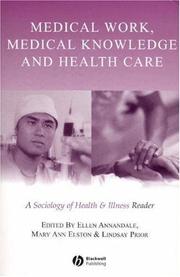| Listing 1 - 6 of 6 |
Sort by
|

ISBN: 0761957464 0761957472 1299657486 1446234630 0857020226 1847876676 9780761957478 9780857020222 9781847876676 9781446234631 9780761957461 Year: 2003 Publisher: London Thousand Oaks, Calif. Sage Publications
Abstract | Keywords | Export | Availability | Bookmark
 Loading...
Loading...Choose an application
- Reference Manager
- EndNote
- RefWorks (Direct export to RefWorks)
This comprehensive, yet concise, introduction to the use of documents as tools within social science research argues that documents stand in a dual-relation to human activity. Therefore by transmitting ideas and influencing the course and nature of human activity they are integral to the research process.
Methods in social research (general) --- #SBIB:303H12 --- #SBIB:043.IOS --- Methoden en technieken: sociale wetenschappen --- Sociology --- Research --- Methodology. --- Social sciences --- Sciences sociales --- Methodology --- Recherche --- Méthodologie

ISBN: 0333464354 Year: 1989 Publisher: London MacMillan
Abstract | Keywords | Export | Availability | Bookmark
 Loading...
Loading...Choose an application
- Reference Manager
- EndNote
- RefWorks (Direct export to RefWorks)
Book
ISBN: 9781849207331 Year: 2011 Publisher: Los Angeles, Calif. Sage
Abstract | Keywords | Export | Availability | Bookmark
 Loading...
Loading...Choose an application
- Reference Manager
- EndNote
- RefWorks (Direct export to RefWorks)

ISBN: 0803985002 9780803985001 0803984995 Year: 1993 Publisher: London Newbury Park Sage Publications
Abstract | Keywords | Export | Availability | Bookmark
 Loading...
Loading...Choose an application
- Reference Manager
- EndNote
- RefWorks (Direct export to RefWorks)
Psychiatrie [Sociale ] --- Psychiatrie sociale --- Psychiatry [Social ] --- Social psychiatry --- Sociale psychiatrie --- Social psychiatry. --- Psychiatry --- Mental illness --- Psychiatric hospital care --- Community mental health services --- Mentally ill --- Psychiatrie --- Maladies mentales --- Hôpitaux psychiatriques --- Services communautaires de santé mentale --- Malades mentaux --- Philosophy. --- Public opinion. --- Deinstitutionalization. --- Philosophie --- Opinion publiques --- Soins --- Désinstitutionnalisation --- Hôpitaux psychiatriques --- Services communautaires de santé mentale --- Désinstitutionnalisation --- Philosophy --- Public opinion --- Deinstitutionalization --- Psychiatric hospital care - Philosophy. --- Community mental health services - Philosophy. --- Mentally ill - Deinstitutionalization.

ISBN: 0631223274 9780631223276 Year: 2005 Publisher: Malden Blackwell
Abstract | Keywords | Export | Availability | Bookmark
 Loading...
Loading...Choose an application
- Reference Manager
- EndNote
- RefWorks (Direct export to RefWorks)
#SBIB:316.334.3M10 --- Medische sociologie: algemeen --- Health Knowledge, Attitudes, Practice --- Sociology of health --- Sociology, Medical. --- Delivery of Health Care. --- Health Knowledge, Attitudes, Practice. --- Social medicine. --- Medical care. --- Médecine sociale --- Prestation de soins
Book

ISBN: 1529746736 Year: 2020 Publisher: London : SAGE Publications Ltd.,
Abstract | Keywords | Export | Availability | Bookmark
 Loading...
Loading...Choose an application
- Reference Manager
- EndNote
- RefWorks (Direct export to RefWorks)
This entry reviews the various ways in which documents have entered into social research practice during the 20th and into the 21st centuries. Four dominant modes of orientation are identified, namely, a focus on documents as sources of data (i.e., for their content); a focus on the ways in which documents - including research reports and data sources - are constructed and assembled; a focus on how people use documents - such as files, folders, and literary texts - in practice; and a focus on documents as agents that can impact upon and influence schemes of social action. In each case, examples - drawn from anthropology, history, literature, philosophy, psychiatry, psychology, and sociology - are cited to illustrate the key issues that characterize the orientation, and the theoretical or historical origins of the approach are identified. The entry concludes by highlighting how a consideration of documents as agents challenges many fundamental assumptions of traditional social scientific inquiry.
Anthropology. --- Business and Management. --- Communication and Media Studies.
| Listing 1 - 6 of 6 |
Sort by
|

 Search
Search Feedback
Feedback About
About Help
Help News
News